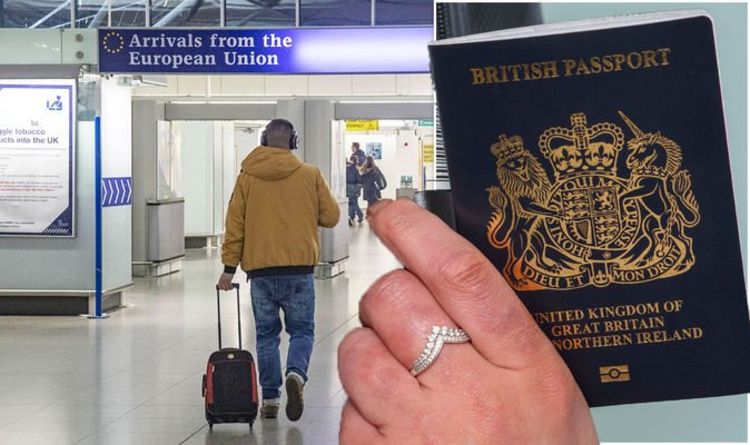Passport warning: Britons caught out by EU expiry rule – how to make sure yours is valid
Brexit: Expert outlines potential travel changes for UK citizens
We use your sign-up to provide content in ways you’ve consented to and to improve our understanding of you. This may include adverts from us and 3rd parties based on our understanding. You can unsubscribe at any time. More info
Brexit brought about a number of changes, but there are some in particular which impact passports. Since travel resumed on May 17, a number of Britons jetting off to European Union (EU) destinations have discovered their passports are not valid for travel.
Since the UK is no longer a member of the EU, travellers are subject to non-member state rules.
One, in particular, means many Britons are classed as having out of date passports, even if the expiration date printed on their travel document still has time left on it.
What are the new passport rules for travelling to the EU?
The Foreign, Commonwealth and Development Office (FCDO) provides up-to-date information on the latest travel rules since Brexit came into force on January 1.
The travel authorities recommend passengers should have at least six months left on their passport from the day they are due to travel.
This allows for travelling in Europe up to three months, as the EU does not require visas for travel during the first 90 days in every 180 days of travel.

Most European countries also require visitors to have at least three months left on a passport on the day after they leave.
Additionally, passports must also be less than 10 years old from the day after you leave.
If a traveller renewed their passport early, they may have had additional months added to their document.
Unfortunately, these add-on months do not count towards the EU expiry date and thus could render a passport invalid.
The only destination where these rules do not apply is Ireland, where British travellers can continue to use their passport as long as it is valid for the length of their stay.
If a passport doesn’t meet these rules, travellers need to apply for a new passport before jetting off.
DON’T MISS
What is an EU Digital Covid Certificate? [INSIGHT]
Book this Hobbit House in the Forest of Dean [INSIDER]
Green list update: When is the next traffic light travel review? [UPDATE]
How can I check if my passport is valid?
UK travellers can manually check their passports using the information provided by the FCDO.
However, the Government also offers an online passport checker for Britons.
In any instance, Britons are urged not to book travel unless they are certain their passport is valid.

Which countries do these passport rules apply to?
These rules apply for travel to and between most countries in Europe. These are:
- Andorra
- Austria
- Belgium
- Bulgaria
- Croatia
- Cyprus
- Czech Republic
- Denmark
- Estonia
- Finland
- France
- Germany
- Greece
- Hungary
- Iceland
- Italy
- Latvia
- Liechtenstein
- Lithuania
- Luxembourg
- Malta
- Monaco
- Netherlands
- Norway
- Poland
- Portugal
- Romania
- San Marino
- Slovakia
- Slovenia
- Spain
- Sweden
- Switzerland
- Vatican City
Source: Read Full Article



